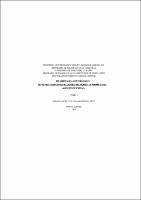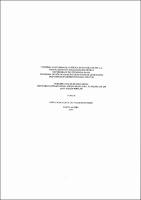| Share record |


|
Please use this identifier to cite or link to this item:
https://tede2.pucrs.br/tede2/handle/tede/2183| Document type: | Tese |
| Title: | Perambulanças de João Grilo : do pícaro lusitano ao malandro brasileiro, as peripécias do (anti-)herói popular |
| Author: | Nascimento Neto, João Evangelista do  |
| Advisor: | Barberena, Ricardo Araújo |
| Abstract (native): | Há, nos estudos da crítica literária, uma série de heróis: de um lado, os clássicos, cuja missão concentra-se em grandes feitos e em um crescimento pessoal; do outro, encontram-se os heróis baixos, cuja força está intimamente ligada ao discurso cômico. Dentre estes, destacam-se o pícaro e o malandro. Esta pesquisa, pois, está pautada na análise da construção da figura do herói popular, a saber, João Grilo, em solo português, e da transformação de seus caracteres quando da sua chegada em solo brasileiro. Desse modo, o pícaro lusitano, guiado pela sorte, abdica do destino em prol do malandro brasileiro, guiado pela sua perspicácia e meticulosidade. Povoando os mais diferentes gêneros textuais, é no folheto de cordel que João Grilo faz morada duradoura e onde empreende uma luta de classes, expondo as desigualdades sociais no Brasil. A partir do estudo desses textos literários, nesta pesquisa, estabelece-se a criação de uma cosmogonia popular, criada com base no intenso processo de diálogos culturais entre Portugal e Brasil. Por meio de estudiosos como Aristóteles (1993), Campbell (2007), Propp (1983), Damatta (1997), Jung (2008), González (1994), Mendes (2008) e Müller (1997), a teoria acerca do herói é contraposta às narrativas literárias. Com Abreu (1999), Peloso (1996), Haurélio (2010), Maxado (2012) e Cavignac (2006), a construção desse herói é relacionada à cultura popular. Com base em Duarte (2006) e Minois (2003), o cômico dialoga com o discurso do pícaro e do malandro. E através dos pressupostos teóricos de Ortiz (1978) e Rama (1982), o conceito de transculturalidade narrativa é utilizado para melhor compreensão dos choques culturais e da formação do malandro popular em solo brasileiro. Portanto, por meio dos estudos empreendidos, é pertinente considerar que, numa sociedade desigual, o pícaro e o malandro servem às classes subalternizadas, por ver, em seus atos, um momento catártico para lidar com as frustrações cotidianas, e aos poderosos, para manter o status quo vigente. |
| Abstract (english): | There is, in studies of literary criticism, a number of heroes: on one hand, the classic ones, whose mission focuses on great achievements and personal growth; on the other, there are the low heroes, whose strength is closely related to the comic discourse. Among these, is the picaro and the trickster. This research, therefore, is guided by the analysis of the construction of the figure of the folk hero, namely John Cricket on Portuguese soil, and the transformation of his features upon his arrival on Brazilian soil. Thus, the Lusitanian picaro, guided by luck, abdicates fate in favor of the Brazilian trickster, guided by his insight and thoroughness. Populating the most different textual genres, is in the cordel flyer that Joãoa Grilo makes lasting abode and where wages a class struggle, exposing social inequalities in Brazil. From the study of these literary texts, this research sets out to create a popular cosmology, created based on the intense process of cultural exchanges between Portugal and Brazil. By scholars such as Aristotle (1993), Campbell (2007), Propp (1983), Damatta (1997), Jung (2008), González (1994), Mendes (2008) and Müller (1997), the theory about the hero is opposed to literary narratives. Abreu (1999), Peloso (1996), Haurélio (2010), Maxado (2012) and Cavignac (2006) were used to relate the construction of this hero to popular culture. Based in Duarte (2006) and Minois (2003), the comical dialogues with picaro and trickster speech. In addition, through the theoretical assumptions of Ortiz (1978) and Rama (1982), the concept of transcultural narrative is used to better understand the culture shock and the formation of popular trickster on Brazilian soil. Therefore, through the studies undertaken, it is pertinent to consider that an unequal society, the picaro and the trickster serve the subaltern classes, to see, in their actions, a cathartic moment to deal with everyday frustrations, and to the powerful people, to keep the current status quo. |
| Keywords: | LITERATURA BRASILEIRA - HISTÓRIA E CRÍTICA LITERATURA DE CORDEL LITERATURA POPULAR PORTUGUESA TRANSCULTURAÇÃO |
| CNPQ Knowledge Areas: | CNPQ::LINGUISTICA, LETRAS E ARTES::LETRAS |
| Language: | por |
| Country: | BR |
| Publisher: | Pontifícia Universidade Católica do Rio Grande do Sul |
| Institution Acronym: | PUCRS |
| Department: | Faculdade de Letras |
| Program: | Programa de Pós-Graduação em Letras |
| Citation: | NASCIMENTO NETO, João Evangelista do. Perambulanças de João Grilo : do pícaro lusitano ao malandro brasileiro, as peripécias do (anti-)herói popular. 2014. 396 f. Tese (Doutorado em Letras) - Pontifícia Universidade Católica do Rio Grande do Sul, Porto Alegre, 2014. |
| Access type: | Acesso Aberto |
| URI: | http://tede2.pucrs.br/tede2/handle/tede/2183 |
| Issue Date: | 26-Aug-2014 |
| Appears in Collections: | Programa de Pós-Graduação em Letras |
Files in This Item:
| File | Description | Size | Format | |
|---|---|---|---|---|
| 462119 v1.pdf | Texto Completo v.1 | 3.39 MB | Adobe PDF |  Download/Open Preview |
| 462119 v2.pdf | Texto Completo v.2 | 14.39 MB | Adobe PDF |  Download/Open Preview |
Items in DSpace are protected by copyright, with all rights reserved, unless otherwise indicated.




